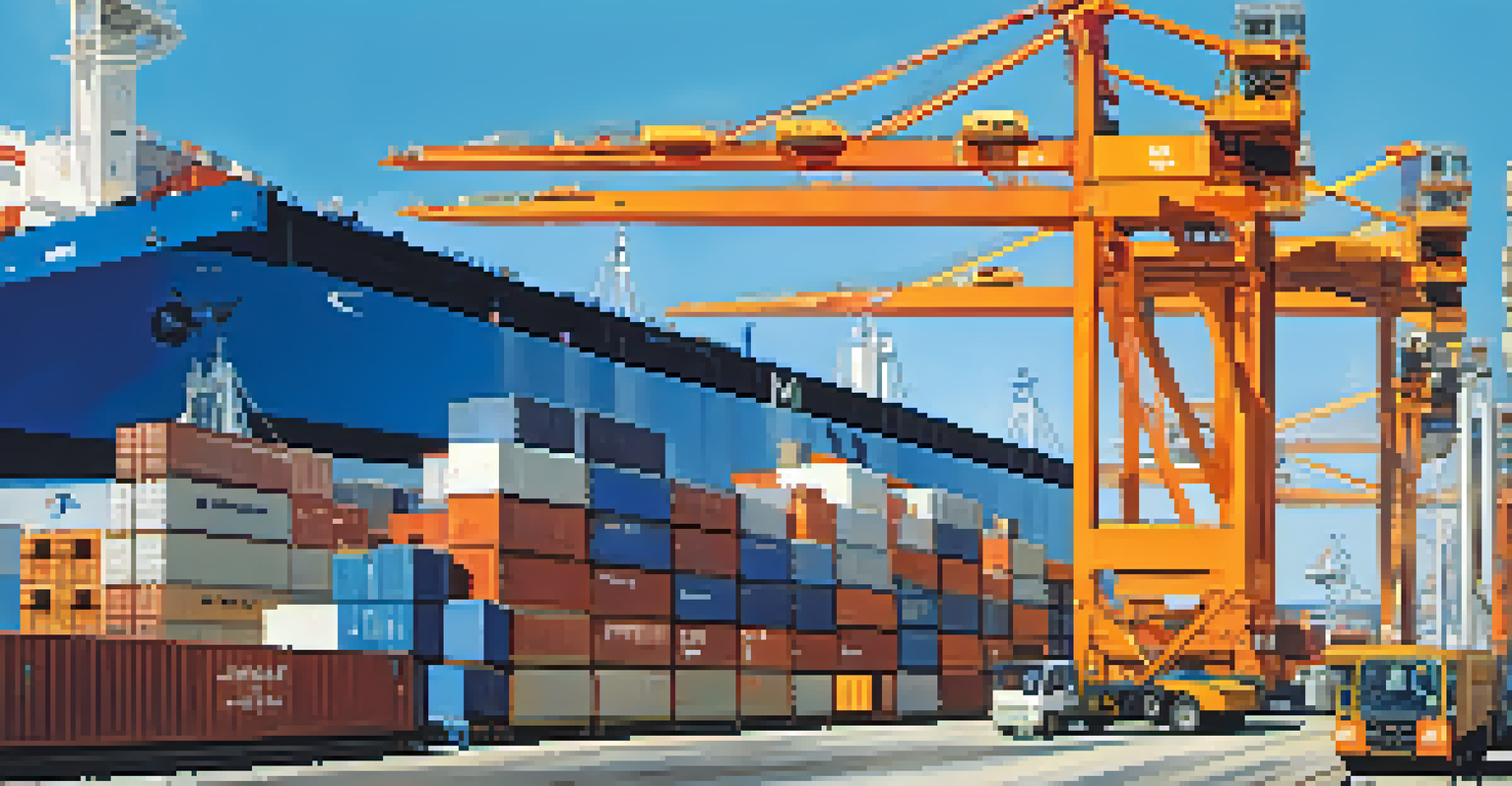Florida's Economic Impact through International Trade Agreements

Understanding Florida's Economic Landscape
Florida boasts a diverse economy that ranges from tourism to agriculture. This diversity makes the state uniquely positioned to benefit from international trade. With its strategic location, Florida serves as a gateway to Latin America and beyond, enhancing its trade potential.
Trade is a critical part of our economy and helps to create jobs and opportunities for American families.
The state's GDP reflects its economic vitality, with significant contributions from various sectors. For instance, Miami is a major hub for international finance and trade, while Central Florida thrives on manufacturing and agriculture. This economic blend allows Florida to adapt and thrive within the global market.
As the state continues to grow, the importance of international trade agreements becomes increasingly evident. These agreements create a favorable environment for businesses, attracting investment and promoting job creation, ultimately enhancing Florida's economic resilience.
Key International Trade Agreements Impacting Florida
Florida's economy is significantly influenced by various international trade agreements, such as the United States-Mexico-Canada Agreement (USMCA). This agreement enhances trade relationships with neighboring countries, benefitting Florida's agricultural and manufacturing sectors.

Additionally, the Central America-Dominican Republic Free Trade Agreement (CAFTA-DR) opens new markets for Florida's exports. By reducing tariffs and trade barriers, Florida businesses can access a wider audience, increasing their competitiveness on a global scale.
Florida's Trade Boosts Economic Growth
The state's diverse economy and strategic location facilitate robust international trade, driving growth across various sectors.
Moreover, the state's involvement in these agreements fosters collaboration among local businesses and international partners. This synergy not only boosts economic growth but also encourages innovation, creating a dynamic business environment in Florida.
The Role of Exports in Florida's Economy
Exports play a crucial role in Florida's economic framework, contributing billions to the state's GDP each year. Key export products include machinery, agricultural goods, and aerospace components, showcasing Florida's manufacturing prowess.
The future of trade is about collaboration, not competition. We must work together to create a prosperous economic landscape.
International trade agreements facilitate these exports by providing Florida businesses with better access to foreign markets. For example, reducing tariffs on agricultural exports increases the competitiveness of Florida's citrus and sugar industries, allowing them to thrive.
The positive impact of exports extends beyond just economic figures; it also supports job creation. As businesses grow due to increased export opportunities, they often expand their workforce, leading to a healthier job market and lower unemployment rates in Florida.
Florida's Strategic Geographic Advantage
One of Florida's most significant advantages is its strategic geographic location. Positioned at the southeastern tip of the United States, it serves as a natural gateway for trade with Latin America, the Caribbean, and Europe.
This prime location not only facilitates quicker shipping times but also allows Florida to build strong relationships with international partners. Ports like the Port of Miami and Port Everglades are pivotal in handling the flow of goods, making Florida a crucial player in global trade.
Job Creation Linked to Trade Agreements
International trade agreements directly contribute to job creation in Florida, particularly in logistics, manufacturing, and agriculture.
As a result, businesses in Florida can capitalize on this geographic advantage, optimizing their supply chains and reducing costs. This efficiency translates into higher profits and greater economic stability, reinforcing Florida's position as a trade leader.
Job Creation through International Trade
International trade agreements have a direct correlation with job creation in Florida. As businesses expand their operations internationally, they often seek to hire more employees to meet increased demand.
Sectors such as logistics, manufacturing, and agriculture see significant growth in job opportunities due to trade. This expansion often leads to higher wages and better benefits for workers, enhancing the overall quality of life in the state.
Furthermore, job creation from trade can have a ripple effect on local economies. As more people enter the workforce, spending increases, which boosts demand for local services and goods, fostering further economic growth in Florida.
Challenges Faced by Florida in International Trade
Despite the benefits of international trade agreements, Florida faces its share of challenges. Fluctuating global markets, trade disputes, and changing regulations can create uncertainty for businesses engaged in international trade.
Additionally, competition from other states and countries can pose a threat to Florida's exports. To maintain its competitive edge, Florida must continue to innovate and support local industries through training and resources.
Challenges in Global Trade Landscape
Florida faces challenges such as fluctuating markets and competition, necessitating collaboration to maintain its trade competitiveness.
Addressing these challenges requires collaboration between government, businesses, and educational institutions. By working together, they can create strategies that not only mitigate risks but also leverage opportunities in the evolving global trade landscape.
Future Outlook for Florida's Economy and Trade
Looking ahead, Florida's economy is poised for continued growth through international trade. As new agreements are negotiated and existing ones are strengthened, the state can expect to see further expansion in key sectors.
Emerging markets, especially in Asia and Africa, present additional opportunities for Florida businesses. By diversifying trade partners and exploring new markets, Florida can reduce its dependence on traditional trading partners and enhance its economic stability.

Ultimately, the future of Florida's economy is intertwined with its ability to adapt to the global trade landscape. By embracing innovation and fostering strong trade relationships, Florida can ensure a prosperous economic future for its residents.